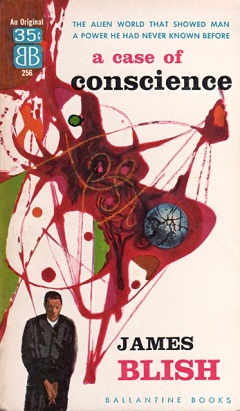A Case of Conscience

Cover of the first edition
|
|
| Author | James Blish |
|---|---|
| Country | United States |
| Language | English |
| Series | After Such Knowledge trilogy |
| Genre | Science fiction |
| Published | 1958 (Ballantine Books) |
| Media type | Print (paperback) |
| Pages | 192 pp |
| ISBN | (later paperback printing) |
| OCLC | 45074320 |
| 813/.54 21 | |
| LC Class | PS3503.L64 C37 2000 |
| Followed by | Doctor Mirabilis |
A Case of Conscience is a science fiction novel by American writer James Blish, first published in 1958. It is the story of a Jesuit who investigates an alien race that has no religion yet has a perfect, innate sense of morality, a situation which conflicts with Catholic teaching. The story was originally published as a novella in 1953, and later extended to novel-length, of which the first part is the original novella. The novel is the third part of Blish's thematic After Such Knowledge trilogy: it thus follows Doctor Mirabilis and Black Easter and The Day After Judgment (two short novels that Blish viewed as forming the second volume of the trilogy).
Few science fiction stories of the time attempted religious themes, and still fewer did this with Catholicism; an exception was Walter M. Miller, Jr.'s Hugo Award-winning post-apocalyptic science fiction novel A Canticle for Leibowitz.)
The story is set in 2049. Father Ramon Ruiz-Sanchez of Peru, Clerk Regular of the Society of Jesus, is a member of a four-man team of scientists sent to the planet Lithia to determine if it can be opened to human contact. Ruiz-Sanchez is a biologist and biochemist, and he serves as the team doctor. However, as a Jesuit, he has religious concerns as well. The planet is inhabited by a race of intelligent bipedal reptile-like creatures, the Lithians. Ruiz-Sanchez has learned to speak their language, the better to get to know them.
While on a walking survey of the land, Cleaver, a physicist, has been poisoned by a plant, despite a protective suit, and he suffers badly. Ruiz-Sanchez treats him and leaves to send a message to the others-Michelis, a chemist, and Agronski, a geologist. He is helped by Chtexa, a Lithian whom he has befriended, who then invites him to his house. This is an opportunity which Ruiz-Sanchez cannot decline; no member of the team has been invited into Lithian living places before. The Lithians seem to have an ideal society, a utopia without crime, conflict, ignorance or want. Ruiz-Sanchez is more than a little in awe of them.
...
Wikipedia
